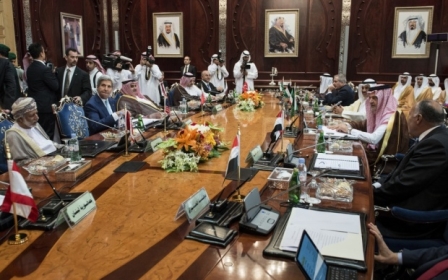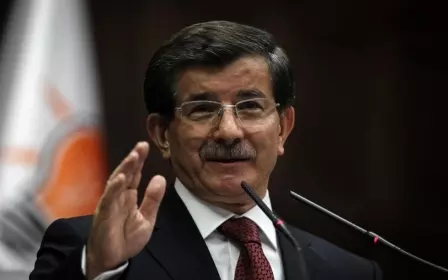Syrian politicians step up calls for ceasefire

DAMASCUS: An ugly complex of high-rise apartment blocks, some of them windowless and only half-built, has become the epicentre of the latest effort to broker a ceasefire in Syria’s civil war. An estimated 300,000 people, many of them displaced from other parts of the country, are crammed into Al-Waer, around five miles west of Homs.
They are under siege from government forces and under the control of some 7,000 rebels who have infiltrated al-Waer, leaving hapless civilians caught between two brutal pressures. Negotiations brought similar sieges to an end in Homs and several Damascus suburbs earlier this year but the talks that are underway in al-Waer are proving more difficult.
In spite of the overcrowding, a humanitarian disaster has been avoided because al-Waer’s siege is far from total. “Civilians go in and out. Food goes in and out unless there’s a flare-up of fighting. There’s no starvation,” said Elia Samman, a member of the Syrian Social Nationalist Party, who was detained by government security police several times before the crisis erupted in 2011.
His party still calls itself an opposition party, although its leader, Ali Haidar, is in coalition with President Bashar al-Assad’s government as Minister for National Reconciliation Affairs. Samman is an adviser to the minister, but said he spoke to Middle East Eye as a member of his party’s executive bureau.
Despite the savage fighting that has ripped Syria apart, there have been some small, local ceasefire deals that have provided brief glimmers of hope over the last year. Samman is a strong advocate of these reconciliation agreements and thinks they offer a way forward.
“They can pave the way to a national dialogue among Syrians, and this would help Syrian society confront the jihadis,” he said. “An agreement in al-Waer would provide amnesty for everyone, except for those who have perpetrated massacres. The gunmen could leave with their weapons.”
The outcome he proposes is modelled on what happened in Homs this spring. It helps civilians, but does nothing to bring disarmament or end the conflict. Hundreds of the rebel fighters now in al-Waer moved there after leaving Homs.
Reconciliation and national dialogue have become watchwords of Assad’s strategy. He mentioned them repeatedly in the speech he made after being sworn in for a third seven-year term as President in July.
Samman, however, believes Assad’s proposals are too vague. “The government should provide a clear action plan and a road map to show it is willing to compromise. There needs to be an open invitation to any Syrian who is ready take part in a round table, and it should not be headed by the government,” he told MEE. “For the government’s talk of a national dialogue to have substance, there need to be local ceasefires, release of detainees, a switch in tactics towards civilians and an agreement to talk to the opposition anywhere.”
The ceasefire negotiators in al-Waer have identified thirty different rebel groups. The vast majority are willing to make a deal, but three are hostile and have managed to block it, Samman said.
Three weeks ago there was a huge demonstration by civilians in al-Waer, urging rebels to leave the area so that the government would lift its checkpoints and allow people free movement. “No-one has been punished by the rebels for taking part in the protest, as far as we know,” Samman said. He welcomed the protest as a sign that civil society is getting bolder and more active in calling for peace.
He acknowledged that the pro-government National Defence Forces, who have replaced the undisciplined “shabiha” militias who emerged at the beginning of the civil war, are also blocking a deal.
“They make money at the checkpoints and are happy to be in an almost safe environment. If reconciliation works, they’ll be moved to another area where there’s fighting. So they fear for their lives”, he said. The NDF also blocked the deal in Homs until the Syrian army and government forced them to back down.
Samman argued that sieges have some value as a military tactic, and are certainly better than bombing an area. “Truces succeed when an area is under siege. If it’s open and rebels have supplies of food and weapons, they won’t be reconciled,” he said.
One problem with the ceasefires is that there is no independent monitoring mechanism. He and his minister raised the issue when they met Staffan de Mistura, the new United Nations envoy, on his first trip to Damascus three weeks ago.
“The UN could be involved in mediation, witnessing agreements, and implementation. It would help to make the rebels feel more comfortable,” Samman said.
His analysis matches many of the conclusions of a comprehensive study of Syria’s ceasefires that is published today (30 September) by a research team at the London School of Economics. Titled “Hungry for Peace” and led by Rim Turkmani, the team found a strong desire for peace among Syrian civilians, “that is expressing itself in an increasing number of bottom-up peace-making initiatives.” The report also concludes that local deals these provide a vital complement to top-down efforts like the two Geneva conferences on Syria.
“If properly supported and observed, local deals could be the best hope for alleviating the suffering of the Syrian people - by reducing levels of violence, providing safe havens within Syria, and offering access to humanitarian assistance. No top-level agreement is likely to succeed without the engagement and commitment of local actors,” report authors said.
The LSE research team also pointed out that a few ceasefires occurred in the first stages of the process, but were either kept out of the media in the hope that secrecy would protect them or they went unreported because the Western and Arab media, as well as their governments, opposed any deals with the Syrian authorities. Now that the cost of the conflict has risen so dramatically, “it is unacceptable to postpone international support for local peace initiatives until a top-level political deal is achieved,” the report notes.
Local conditions vary enormously so the details of ceasefires and who can negotiate them will be different. Local leaders have a better understanding than leaders in exile. According to the report, a unified leadership is unlikely to emerge within a fractured society, which means that people within and outside Syria need to engage with civil society in every town and village, including civic councils and tribal leaders.
The report goes on the blame outside governments and forces at the international and regional level for blocking the potential for peace by continuing to supply weapons and funding to armed groups. The growth of the war economy in which warlords make profits is a further threat to peace-making initiatives.
The report recommends an end to the flow of foreign weaponry to all sides and calls for international mediation and monitoring of ceasefires and local peace deals.
Other voices have also stepped up recently, calling for a nationwide truce to be enforced.
A group of Syrian senior clerics and intellectuals yesterday appealed for a ceasefire to start on Friday this week, the start of the festival of Eid al-Adha. They include Moaz al-Khatib, the former president of the Syrian National Coalition, who stepped down in April 2013, reportedly over frustrations about international meddling in the conflict.
“A painful future is on the horizon, in which the human capital of Syria will be squandered,” Khatib said. “We have lost the majority of our best minds – this is killing us almost as weapons have.
Syria has become “a battle-ground for agendas foreign to the best interests of Syrians.” The conflict has ruined the belief of Syrians that “they are still able to end this tragedy,” Khatib added, while calling on all factions to lay down their arms during Eid and to “respect the choices of the Syrian people and their will.”
Stay informed with MEE's newsletters
Sign up to get the latest alerts, insights and analysis, starting with Turkey Unpacked
Middle East Eye delivers independent and unrivalled coverage and analysis of the Middle East, North Africa and beyond. To learn more about republishing this content and the associated fees, please fill out this form. More about MEE can be found here.




